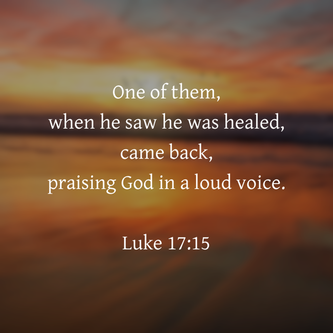|
Good morning! We're so happy you've decided to join us today! Today's lesson is about Jesus healing a group of men with leprosy. One of the hymns that came up for the scripture is a chant: Kyrie Eleison. This is a Greek phrase meaning, "Lord, have mercy." When we meet in person, we share our joys and concerns together. If you are at home, take some time to think about your past week. If you have any prayer requests you would like to share, you can post a comment on our Sunday School lesson. When you are ready, you can use the prayer below from Saint Catherine of Siena to get started: Merciful Lord, it does not surprise me that you forget completely the sins of those who repent. I am not surprised that you remain faithful to those who hate and revile you. The mercy which pours forth from you fills the whole world. It was by your mercy that we were created, and by your mercy that you redeemed us by sending your Son. Your mercy is the light in which sinners find you and good people come back to you. Your mercy is everywhere, even in the depths of hell where you offer to forgive the tortured souls. Your justice is constantly tempered with mercy, so you refuse to punish us as we deserve. O mad Lover! It was not enough for you to take on our humanity; you had to die for us as well. Amen This week's lesson is on Leviticus 13:45-46 and Luke 17:11-19. Introduction: Leprosariums Nancy Brede was taken from her family at age 13 in 1936 after being diagnosed with leprosy. She was isolated with other youth and children at a leprosarium (the modern equivalent of a leper colony) in Hawaii. At best, leprosariums were places where patients could go for medical care; at worst these were places of exile. Nancy and others were quarantined in accordance with Hawaiian law that was in force at the time. Due to the infectious nature of leprosy (Hansen's Disease), quarantine was deemed necessary until the advent of antibiotic drug therapies in the twentieth century. Even so, many leprosariums still exist in the world. Leprosy was well known in the ancient world as well. Today's lesson tells of a band of ten infected, quarantined men who had just one hope: Jesus. Lesson Context The two passages in this lesson were written more than 1,000 years apart. The text from Leviticus gives important context for the account in Luke. Leviticus 13 is devoted to the identification and regulation of skin disease as part of the legal code for Israel. The ancient Israelites would have seen this as a religious and community issue. They saw physical afflictions as more than health issues; they understood them as punishment for sin (compare John 9:1-2). A person identified as having leprosy was unclean. The banishment that occurred amounted to a sentence of lifelong shame and isolation. The appearance of leprosy was a life-altering event that usually ended only with death. The term leprosy today is identified with Hansen's Disease only -- a slowly progressing bacterial infection that causes disfigurement and nerve damage. Biblical descriptions of leprosy are not precise enough to narrow it to any single skin condition known today. In both the Old and New Testaments, the word leprosy seems to describe skin diseases in a more general sense. Tension between Jews and Samaritans is an undercurrent in today's lesson. Jews and Samaritans were religious and ethnic cousins, sharing a common ancestry and both loyal to the Law of Moses. But events starting with the division of Israel into two kingdoms in about 930 BC, and made worse by the northern kingdom's exile to Assyria in 722 BC, alienated the two groups. After the northern kingdom's exile, those remaining intermarried with the peoples that the conquerors resettled in the land. This mixture of different people and culture resulted in the Samaritans. Lesson: Leviticus 13:45-46 This passage gives us some background to the laws for people identified as having leprosy. Our book says that describing it as a "defiling disease" suggests that it was considered a divine affliction. In Exodus 11:1, which talks about the death of the firstborn of Egypt, the same Hebrew word is translated "plague." Further, the manner of dress was associated with mourning, which we might think of as perpetual mourning for their lost life. The Old Testament laws tell us that those with leprosy were permanently quarantined outside of camp during the years in the wilderness. Then, places of quarantine were put outside the villages in the promised land. These people were isolated physically and socially. They could not participate in any community activities, such as weddings, funerals, synagogue meetings, or temple activities. They had to rely on the kindness of friends and family members for survival. Lesson: Luke 17:11-19 Now, we've moved to the New Testament. Jesus is traveling toward Jerusalem, going over land. This puts him in Samaria. Our book notes that this would be the shortest route, but that many Galilean Jews would make the trip via the Jordan River valley, in order to avoid Samaria. There wouldn't be a border like we think of now between countries. The distinction would largely have been the makeup of the villages. The men with leprosy call to Jesus to have pity or mercy on them, in hopes of being healed. They address him as Master. The original Greek word is only used in Luke's Gospel. It is a term of respect, primarily used by Jesus' disciples. For the men with leprosy to have called Jesus in this way implies that they had some knowledge of him. Jesus had already healed some cases of leprosy at this point. It is probable that friends or relatives who provided for these men had shared stories they had heard. Jesus does not go up to the men. Instead, he tells them to show themselves to the priests. As in other places in the New Testament, Jesus speaks as if the men have already been healed. They simply need to have a priest certify that they were cleansed. The men turned to go to the priests, who may have been in a nearby village, and they were healed. One of the men saw that he was healed, and came back. He threw himself at Jesus' feet and thanked him. This posture of thanksgiving and submission seems pretty reasonable. But then, we get the twist: this man was a Samaritan. The only man from this group who thought it was important to thank Jesus was from a group that was very looked-down-on. For the readers at the time, this would be a big deal, just like the good Samaritan (Luke 10:25-37). Jesus points this out even further when he says that only "this foreigner" returned to give praise to God. Our book says that Jesus' question of "Where are the other nine?" is a rhetorical one. It was meant to make the listeners reflect. Why did only one of the ten pause to first praise God and thank Jesus? We can reflect in a similar way. When we are blessed, are we more like the one or the other nine? What can we do to ensure that expressing gratitude for God's blessings is one of our regular practices? Jesus then addresses the Samaritan man who returned. The man's faith has made him well. The man's trusting expectation in God, as demonstrated by his initial act of obedience to seek out the priests, was pleasing to God, by whose power the leprosy was vanquished. Our book notes that the word translated into, "made you well," is also translated as "saved." Jesus offered physical healing to some, and it had to be expected by faith. He offered salvation from sin to all, and it too had to be expected by faith. Conclusion Life doesn't get much worse than the fate of a person with leprosy in Jesus' day: excluded from the community, required to be self-degrading in word and appearance, and destined to live with a slowly fatal and painful disease. It was a living death. Yet a heart of thankfulness survived in the Samaritan man with leprosy. He remains a worthy example of the biblical way to worship. He overcame the urgencies of his life to stop, turn around, and look at Jesus without being distracted. He let praise for God well up from his heart and be expressed in his words. He gave thanks to the one who has healed him, claiming no credit for himself. God does not need our thanks. But he created us as beings who need to give thanks. The unthankful life can become bitter and cold. The thankful heart will find peace and purpose in all circumstances. May we learn from the man who returned that even in the humblest of circumstances, there is nothing to prevent us from giving praise and thanks to God -- nothing except our own selfish and stubborn hearts. May we recognize our spiritual poverty, ask for God's mercy, and give praise and thanks when it arrives. Prayer Lord God, may we worship you without distraction or impatience. We pray in the name of the one who heals and saves, Jesus our Lord. Amen. Benediction This week's benediction is from the New King James Version. Next week's lesson will be on Romans 1:8-17.
0 Comments
Leave a Reply. |
AuthorWe are a small, rural Presbyterian church in southwestern Pennsylvania. Archives
July 2024
Categories
All
|



 RSS Feed
RSS Feed